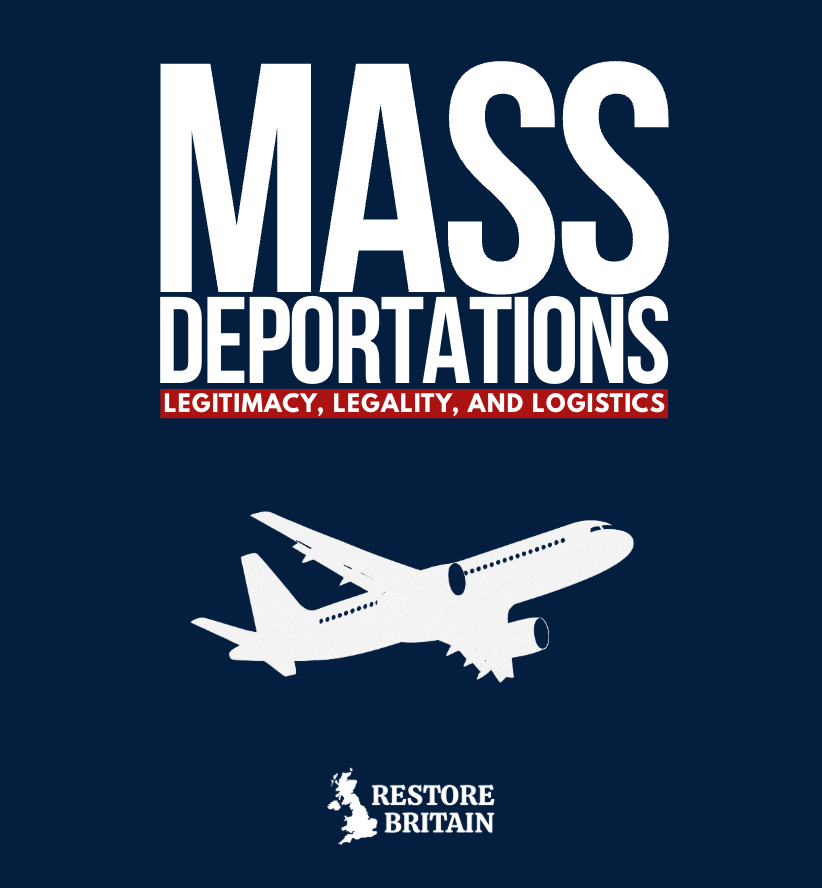
A review of Restore Britain’s mass deportations report
PETE NORTH

Today, I’m quite disappointed. Restore Britain has published a report on mass deportations. With Harrison Pitt in the mix I had hoped for a lot better. Instead, it’s a cut-and-paste hack job of recent works on ECHR withdrawal, all of which have totally ignored the political implications.
At 113 pages, much of it is padding and recycled tract. While I do appreciate detail, I do not like waffle, and you can say the same things in half as many pages. This is a time-honoured approach in the think tank bubble to make such works look more comprehensive than they actually are. Since I’ve read a lot of the source materials, I know that much of this is smoke and mirrors.
As yet, nobody – not Lilley, Braverman or Wolfson have convincingly made the case that ECHR withdrawal does not breach the GFA, but as we’ve already explored, it’s immaterial. Just because something is legally feasible does not mean it’s politically feasible – and even if something is feasible, it doesn’t necessarily mean it’s desirable or necessary. The politics in this instance have been glossed over again.
One such example of this is when they say “We therefore recommend that a future government intent on clearing the legal obstacles to mass deportations should resolve the Northern Ireland question by maintaining in Britain’s domestic law only the small slither of ECHR precedent that has a bearing on the rights of Catholic and Protestant communities in Northern Ireland”.
This is unilateral cherry-picking and it will not fly politically. This smacks of the WTO Brexiteer attitude of “we’ll do as we please and the EU can suck it”. That will not go down very well at home or abroad. Lawfare there will be. A tsunami of it, in fact.
There’s only two possible outcomes to this. The GFA is treated with such flagrant disregard that the entire Northern Ireland settlement implodes, or a messy compromise is reached, but one with many loopholes and back doors. Certainly so if the Windsor Framework remains in place.
As with other recent works, the significance of the Windsor Framework is underrated. Putting it bluntly, the most recent reports in circulation (cited by this report) are hot garbage – especially Braverman’s effort. This has always been a problem with these kind of reports where every subsequent effort absorbs the errors of its predecessor.
The Restore Britain report asserts “In short, the Windsor Framework does nothing to abrogate Britain’s right to trigger Article 58. Nor does it infringe upon our right to exercise parliamentary sovereignty over the effect and scope of the HRA in domestic law”.
That’s very much a contestable opinion, and in my view, it will be contested, and it will be the ECJ presiding on the matter – and it misses the point that that Article 2 if the Windsor Framework very much does cover EU retained rights and regulations including EU CFR. There is no Get Out of Jail Free card. Even without the ECHR to call upon, activist lawyers have several fallbacks they can use. If the objective of ECHR withdrawal is to put a stop to lawfare then it is not going to work.
The report states “Christopher McCrudden has made it clear that the means by which rights are upheld is irrelevant, so long as they continue to operate in some satisfactory form:
“While the substance of the rights in existence before withdrawal [from the EU] and underpinned by EU law must be retained in Northern Ireland, there is no obligation to retain specific EU measures themselves, but article 2 [of the Windsor Framework] obliges the UK to achieve the functionally equivalent result: it has some discretion (within limits) over how to achieve that result.”
Note the words “functionally equivalent”. In EU bureaucratese that tends to mean “the same”, and again, the arbiter is the ECJ. Good luck with that.
In fairness, this report does unearth some peripheral legal obstacles I hadn’t considered, and I concur that Carswell’s judicial reforms should be implemented – but nothing here persuades me that ECHR exit isn’t a fool’s errand. I keep coming back to the fact that the Strasbourg court rarely rules on UK immigration cases, and the British government tends to win. The ECHR has been given disproportionate significance through misreporting of asylum rulings, all of which come from compromised British judges in British courts. The problem is much closer to home.
As such, the priority is to first make all the necessary domestic reforms before even thinking about pulling the trigger on ECHR exit. Leaving the ECHR entails a lot of lengthy and unproductive politics when the case simply isn’t made that the ECHR is the central problem.
Depressingly, though, the entirety of the British right has bought the litany of Tory excuses – hook, line and sinker. The propensity is always to blame an external factor rather the the absence of political will. Big, bold gestures are preferred over precision. They’ve decided they want to leave the ECHR regardless, and go out looking for any and all post-hoc justifications.
Legal arguments, most of which are contestable, take up about half of this report and it’s not until page 54 that we get down to the practicalities. In my view, this would have been better off being two reports; one dealing with the legal arguments and the second dealing with the practicalities. Though for the first half, seeing as they leaned heavily on existing works, they could simply have recommended their conclusions to instead concentrate on real world enforcement issues. But they needed the padding and this report would’ve looked pretty threadbare without it.
The second half is actually the more pertinent part – in which there’s some good stuff that escaped my attention, but much of it will be very familiar to those who read my work.
In my view, central to getting on top of the problem is closing down all the pull factors and that means addressing illegal working and unlawful housing practices. The report does bring this up, but this is where the serious attention is required. If you seriously want to dent the problem then you have to rebuild all arms of local authority enforcement and that will require reform of local government (a return to real localism).
The report alludes to local enforcement on page 81/82, and the similarities with my work do not seem coincidental. It sticks in the craw a little that people who have contributed nothing whatsoever to the policy debate are mentioned in the acknowledgements, while some of my ideas are lifted almost verbatim. (I’ve sent these articles and others to Harrison Pitt). But then long time readers will know this is how the London set behave. Professional courtesy doesn’t exist inside the M25. Nothing new under the sun.
That they’ve under-explored these issues tells us that they don’t understand the significance of them. As it happens, there’s a lot more work to be done on local authority enforcement. There is a deep and complex connection between illegal immigration and organised crime, particularly the drugs trade, and it underscores that the explosion of illegal immigration is ultimately a consequence of dismantling the administrative state – from environmental health and housing inspection through to policing and the courts.
The wholesale withdrawal from community policing, for example, demoting constables to glorified taxi drivers and booking clerks, has diminished the effectiveness of the police, while the closure of hundreds of local courts has only added to the backlog in the justice system, allowing migrants ample opportunity to disappear into the woodwork. The workload has badly skewed enforcement priorities.
There is also no mention in the report of the many pipelines for illegal immigration. The care sector and higher education are the obvious pipelines for visa overstayers and bogus asylum claimants – and these are two sectors that require a major overhaul in their own right. Dealing with the problem calls for a wider manifesto – recognising that dikats from Westminster are worthless without a full spectrum of enforcement arms. Immigration policy is almost secondary to the necessity to rebuilding the administrative state to its pre-austerity capabilities.
The missed opportunity with this report, given the research facilities available to Restore Britain, would have been to interrogate local authorities via FoI to chart the decline in inspections, the decline in enforcement headcount, and the decline in prosecutions for a whole array of offences. There was an opportunity to add new and original data to the debate.
On the whole, there isn’t much in this report that that hasn’t already been explored here and on the Manifesto Project site. In fairness to Restore Britain, its report is an improvement on the usual slop served up by the populist right, but it’s derivative and doesn’t add anything to the debate. Moreover, if they’re saying a successful programme of remigration is contingent on leaving the ECHR, then it seems likely that the whole agenda will be bogged down in constitutional and legal wrangling for years before the first aircraft takes to the skies.
This article (A review of Restore Britain’s mass deportations report) was created and published by Pete North and is republished here under “Fair Use”

••••
The Liberty Beacon Project is now expanding at a near exponential rate, and for this we are grateful and excited! But we must also be practical. For 7 years we have not asked for any donations, and have built this project with our own funds as we grew. We are now experiencing ever increasing growing pains due to the large number of websites and projects we represent. So we have just installed donation buttons on our websites and ask that you consider this when you visit them. Nothing is too small. We thank you for all your support and your considerations … (TLB)
••••
Comment Policy: As a privately owned web site, we reserve the right to remove comments that contain spam, advertising, vulgarity, threats of violence, racism, or personal/abusive attacks on other users. This also applies to trolling, the use of more than one alias, or just intentional mischief. Enforcement of this policy is at the discretion of this websites administrators. Repeat offenders may be blocked or permanently banned without prior warning.
••••
Disclaimer: TLB websites contain copyrighted material the use of which has not always been specifically authorized by the copyright owner. We are making such material available to our readers under the provisions of “fair use” in an effort to advance a better understanding of political, health, economic and social issues. The material on this site is distributed without profit to those who have expressed a prior interest in receiving it for research and educational purposes. If you wish to use copyrighted material for purposes other than “fair use” you must request permission from the copyright owner.
••••
Disclaimer: The information and opinions shared are for informational purposes only including, but not limited to, text, graphics, images and other material are not intended as medical advice or instruction. Nothing mentioned is intended to be a substitute for professional medical advice, diagnosis or treatment.
Disclaimer: The views and opinions expressed in this article are those of the author and do not necessarily reflect the official policy or position of The Liberty Beacon Project.






Leave a Reply